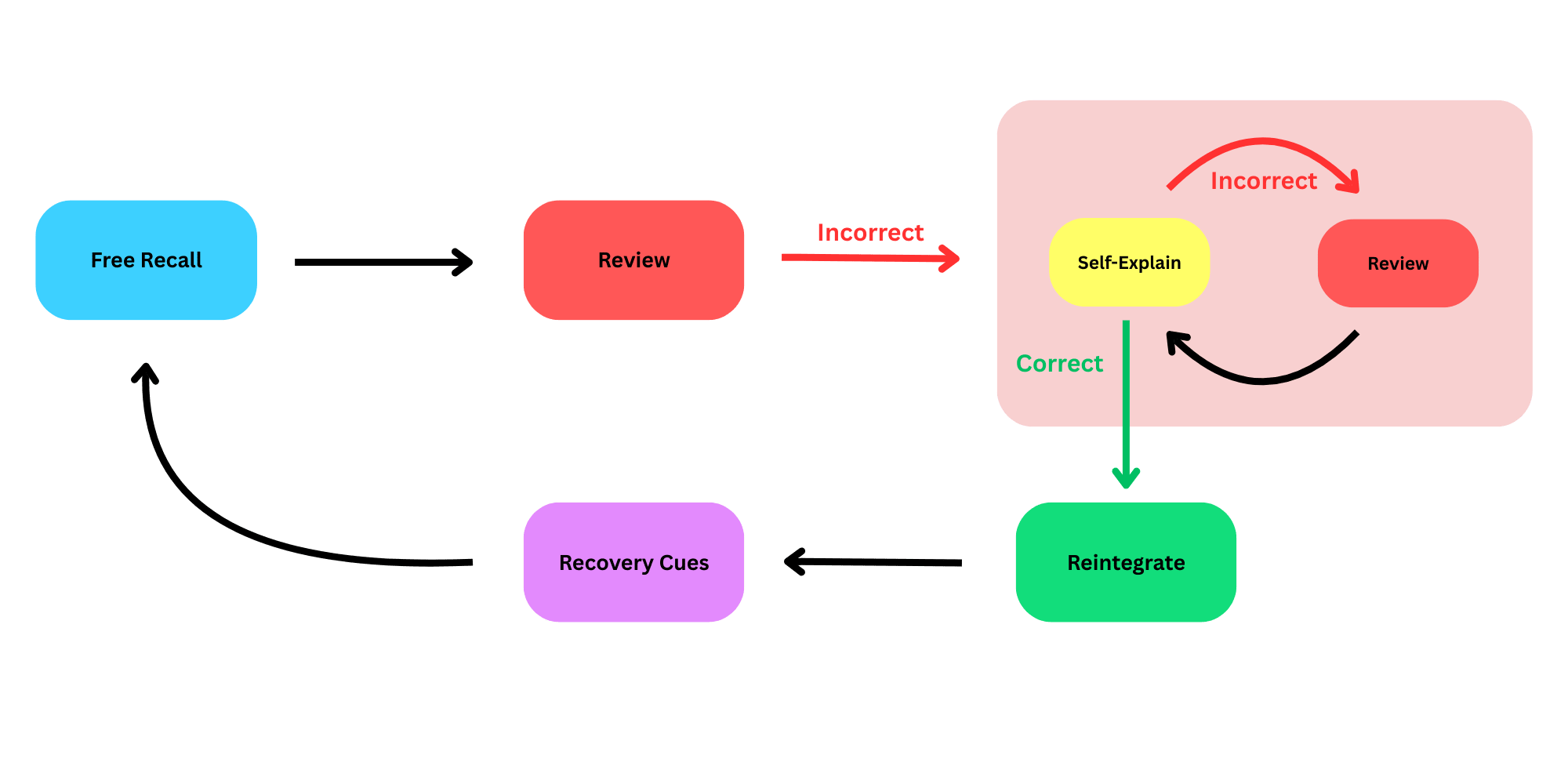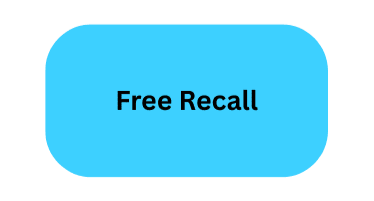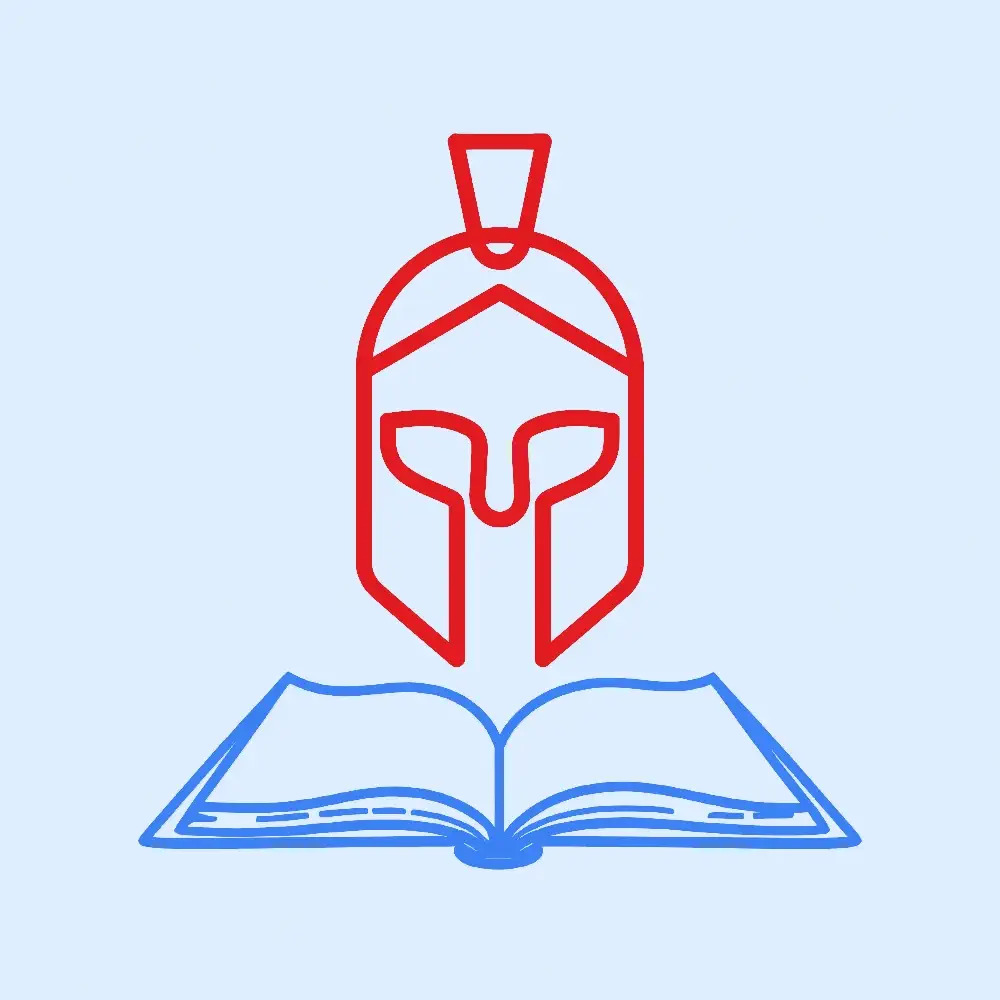The mastery loop: a brutally efficient study method
(10 minute read)

"Study smarter, not harder" is a myth.
Effective studying should feel difficult: decades of science prove it. [1]. The key is that certain difficulties work better than others.
After years of researching the science of learning, this is the most efficient way to learn facts and concepts that I could come up with. It works phenomenally in both classes and self-study.
So here's how to work smarter AND harder. This article's a bit dense, but trust me, it'll be worth it. There's a summary at the end.
1. Free recall

Knowing something is only useful if you can access it.
If you can't access knowledge, you can only recognize it when you see it. But if you can access knowledge, you'll be able to remember it and use it for whatever you want.
Attempting to remember things is the way to practice accessing knowledge. That's why re-reading isn't such an effective study technique: it doesn't require you to remember anything.

Adapted from Karpicke, J. D., & Blunt, J. R. (2011). Retrieval practice produces more learning than elaborative studying with concept mapping. Science, 331(6018), 772–775. https://doi.org/10.1126/science.1199327
How do you get better at remembering things without any help? The answer is to remember them without any help. This deceptively simple technique has a name: free recall.
Just write everything you can remember about a topic onto a blank sheet of paper. Free recall is difficult because you get no specific cue, but that’s exactly why it’s powerful [2].
It's more effective than re-reading, even if you don't follow with feedback [3] .
Flashcards, by comparison, are a flawed practice. Instead of practicing remembering things without help, you practice remembering things with help. Which isn't as helpful, say, on an exam that doesn't provide the same kind of help.
Here are some advantages of free recall over flashcards:
-
Improves accessibility of knowledge [4,5]
-
Improves retention of knowledge [4,5]
-
Enhances transfer to new situations [6]
-
Strengthens related knowledge [7]
-
Facilitates future learning of related knowledge [8,9]
-
Induces plasticity, amplifying effectiveness of immediate restudy [9]
-
Reveals knowledge gaps [10]
But free recall has a flaw — it only strengthens what you can already remember. The details you can’t recall don’t get any stronger [4]. In other words, free recall makes the strong stronger, but leaves the weak behind.
But that’s exactly what the Mastery Loop was built to solve. It's my multi-pronged approach to fill in free recall's one fatal weakness.
The first part of this approach is stepwise cueing.
What is stepwise cueing
When you recall a topic, some of your memories about it are strong, while others are weak.
Free recall is hard. You'll be able to recall the strongest memories, and they get stronger. But the weaker memories are too weak for you to remember without help. How do you make them all stronger? How do you push each memory to its limit?
The solution is to start with free recall and gradually add hints. For instance:
-
Free recall: strengthens strong memories.
-
Some hints: strengthens medium memories.
-
Lots of hints: strengthens weak memories.
The harder something is to remember, the more it benefits from successful recall — difficult recall produces larger long-term gains than easy recall [5, 11]. Stepwise recall ensures each memory is pushed to the toughest level it can handle while still being successfully recalled.
That's why it's key to start with the hardest (free recall) and then make it easier, not the other way around. Giving hints too early wastes the chance to fully strengthen the memories that could handle the challenge. If there were something that you could have remembered without help, it's a waste of potential to remember it with help.
How to use stepwise cueing
Here's my favorite way to use stepwise cueing in practice:
-
Free recall until you can't remember any more
-
Look at an overview of the topic, and recall anything else that comes to mind until you can't remember any more
-
Start reviewing the full topic from the beginning. If anything comes to mind during review, recall it from memory (you won't "gain" as much as recalling without any help, but any amount of recall is better than passively reading)
The second step (overview) is the most important. It gives next to nothing away, so it's essentially still a free recall. If you forgot to recall an entire subtopic, you now have a chance to do so without any help.
Here's an example. Say you want to practice recalling a cell structure lecture from your biology class:
-
Without any help, you recall everything you can remember about cell structure.
-
You then look at only the major topics in cell structure (you might check the major headings in your notes, or the learning objectives on the slideshow, etc.): "Prokaryotics vs eukaryotic", "organelles" "phospholipid bilayer" "structural proteins"
-
You realize you forgot to recall anything about the phospholipid bilayer, so you recall everything you can remember about it.
-
-
As you read through the slideshow to check your understanding, you're reminded of a few organelles you didn't recall already. Before reading further, you recall everything you can about them. You continue reading and recalling everything that comes to mind until the end of the slideshow.
And that's how you get twice the juice from half the orange, so to speak.
Free recall is most effective with feedback, so the next step is to review.
2. Review after free recall

The next step is to visit the source material. As mentioned before, you should continue recalling things that come to mind as you read/watch through.
Thanks to a quirk of free recall called retrieval-induced plasticity, knowledge enters a sort of “edit mode” immediately after. This leads to significantly better learning even if the free recall was completely incorrect [5, 6].
As you read, your brain is especially primed to notice those inaccuracies. But these corrections aren’t always consolidated just by reading them [12, 13].
What follows is the second half of my approach: a process to thoroughly correct each inaccuracy as you find it.
3. How to relearn details you couldn't recall

A failure to recall something is a failure of connection. Remembering happens through spreading activation, so if a memory wasn't activated, it's because it wasn't interconnected well enough with your other memories [14].

The first step is self-explanation. Compared to other learning techniques, self-explanation is robust and broadly effective [15]. For each incorrect fact/concept:
-
Explain the "what?": explain fact/concept in your own words, in context
-
Explain the "why?" behind the fact/concept in your own words (if applicable)
Both steps form connections to help you retrieve the knowledge later. But they serve slightly different purposes.
Explain "what?"
Explaining something in your own words forces you to extract meaning from information. It's kind of like translating information into knowledge by putting it into terms of how you think.
If you explain that something in context, it has the same effect, but it also creates strong links among that fact/concept and related knowledge. This makes it especially likely that the fact/concept will be activated and remembered the next time you recall the topic.
...and don't peek
Here's the key: self-explain without looking at the material. It's the same idea as above: the less help you have as you recall knowledge, the stronger it will be stored. The effect isn't overly strong because the material is still fresh in your mind, but it helps regardless. It's like a mini-recall.
Also, it forces you to confront whether there are gaps in your explanation. If you try to explain something while you're looking at it, a "fluency illusion" can take place: your brain tricks you into thinking you know something better than you actually do [16, 17].
After each self-explanation attempt, look back at the material to make sure your explanation was accurate. If not, repeat.
Explain "why?"
Answering "why?" links the fact/concept to a stronger schema: your understanding of how things work. Connecting information to underlying principles or causal schemes leads to better retention [12, 18].
Moreover, understanding "why?" makes knowledge more useful: you can transfer it to more situations [6, 18].
In short:
-
Explaining what → strengthens memory locally (concept-level).
-
Explaining why → strengthens memory systemically (network-level), increases transfer and retention

Almost done...
Add each missed detail to a small written list. Turn it into a cue you can use to test yourself again. I keep my list in the corner of the page I was free recalling on.
If, during review, you realize that you failed to recall that "mitochondria is the powerhouse of the cell", you might write "____ = powerhouse of the cell" on the corner of your page.
Last step coming up...

Free recall is a messy process, especially if your handwriting looks like mine. But as the paper gets messier, your mental schemas become more organized
4. The final recall
Now you should have a list of what I call "recovery cues": cues you can use to access knowledge that you previously missed.
Go down your list, and recall everything from the hints (recovery cues) you wrote down. Cross everything off as you remember it.
The process would repeat until there's nothing left on your list. But in practice, I've never had to continue beyond one final recall of my initial list.
Since this last recall is delayed rather than immediate, it's more effective [4].
So far, we've done a lot to reinforce these missed details. It's a bit overkill, but by design. It's good to be especially meticulous about the details you got wrong in the initial recall because:
-
There's more opportunity for growth in weak points.
-
Retrieval-induced forgetting. The act of recalling information means the details you don't recall correctly actually get a little weaker [19]. That doesn't mean retrieval isn't worth it: not by a long shot. But it's a good reason to recall these details correctly at least once before you're done.
Efficiency amplifiers: why it works
-
Free recall: Effortful, cue-free retrieval
-
Metacognition: Identify & fix gaps
-
Retrieval plasticity: Memory malleability post-recall
-
Self-explanation and review: Self-explain + review + repeat
-
Explain "Why?": more durable, transferable knowledge
-
Generation: Create own connections
-
Micro-retrieval during self-explanation
-
Delayed final recall: retrieve missed knowledge
-
Low setup: Simple tools (pen + paper)
Lastly, a defined system prevents haphazard learning. We'll default toward ineffective methods if we don't deliberately decide otherwise. It's just the way we're wired. But our humanity lies in the power to overcome boundaries by conscious effort and thoughtful self-awareness.
This entire process will feel difficult, and you'll probably feel like you know nothing. But that's completely normal: your knowledge is truly being put to the test. And the struggle is growth: your brain is making new connections. Desirable difficulty is perhaps the most recurring theme in this science, and this loop is packed with desirable difficulties.
It's important to remember that effective study methods usually feel ineffective, and vice versa (see below). So trust the process.


Actual performance
Predicted performance
Adapted from Karpicke, J. D., & Blunt, J. R. (2011). Retrieval practice produces more learning than elaborative studying with concept mapping. Science, 331(6018), 772–775.
vs.
Summary of steps to the mastery loop
1. Free recall w/ stepwise cueing
-
Free recall everything you can
-
Look at an overview of the topic, and recall anything else you can
2. Review the material
-
Continue to recall what you can as you review the material
3. For each missed detail...
-
Self-explain the detail in context
-
without peeking
-
-
If applicable, self-explain the "why?"
-
Write down a recovery cue to recall the detail later
4. Final recall
-
Recall every missed detail on the recovery cue list
-
Repeat until no recovery cues are left

The mastery loop is extraordinarily effective for declarative learning (like biology, history, psychology, etc.), but it doesn't lend itself to problem-solving (like math, chemistry, economics). To study problem-solving, we'll use other methods.
References:
1. Bjork, R. A., & Bjork, E. L. (2011). Making things hard on yourself, but in a good way: Creating desirable difficulties to enhance learning. In M. A. Gernsbacher, R. W. Pew, L. M. Hough, & J. R. Pomerantz (Eds.), Psychology and the real world: Essays illustrating fundamental contributions to society (pp. 56–64). New York: Worth Publishers. 2. Karpicke, J. D., & Blunt, J. R. (2011). Retrieval practice produces more learning than elaborative studying with concept mapping. Science, 331(6018), 772–775. https://doi.org/10.1126/science.1199327 3. Carrier, M., & Pashler, H. (1992). The influence of retrieval on retention. Memory & Cognition, 20(6), 633–642. https://doi.org/10.3758/BF03202713 4. Roediger, H. L., & Karpicke, J. D. (2006). Test-enhanced learning: Taking memory tests improves long-term retention. Psychological Science, 17(3), 249–255. 5. Karpicke, J. D., & Roediger, H. L. (2008). The critical importance of retrieval for learning. Science, 319(5865), 966–968. 6. Butler, A. C. (2010). Repeated testing produces superior transfer of learning relative to repeated studying. Journal of Experimental Psychology: Learning, Memory, and Cognition. 7. Chan, J. C. K., McDermott, K. B., & Roediger, H. L. (2006). Retrieval-induced facilitation: Initially nontested material can benefit from prior testing. (see full citation in Chan et al., 2006). 8. Carpenter, S. K. (2009). Cue strength as a moderator of the testing effect: The benefits of elaborative retrieval. Journal of Experimental Psychology: Learning, Memory, and Cognition 9. Arnold, K. M., & McDermott, K. B. (2013). Test-potentiated learning: Distinguishing between direct and indirect effects of tests. Journal of Experimental Psychology: Learning, Memory, and Cognition, 39(3), 940–945. 10. Karpicke, J. D., Butler, A. C., & Roediger, H. L. (2009). Metacognitive strategies in student learning: Do students practice retrieval when they study on their own? Memory, 17(4), 471–479. 11. Bjork, R. A. (1994). Memory and metamemory considerations in the training of human beings. In J. Metcalfe & A. Shimamura (Eds.), Metacognition: Knowing about knowing (pp. 185–205). MIT Press. — Introduces the concept of “desirable difficulty” in retrieval. 12. Roediger, H. L., & Butler, A. C. (2011). The critical role of retrieval practice in long-term retention. Trends in Cognitive Sciences, 15(1), 20–27. — Notes that simply re-exposing learners to correct information after errors is often insufficient; active retrieval or elaboration is needed for consolidation. 13. Butler, A. C., Karpicke, J. D., & Roediger, H. L. (2007). The effect of repeated testing on recall and recognition. Memory, 15(3), 237–246. — Shows that merely reading correct answers after retrieval failure produces smaller retention gains than attempting retrieval again. 14. Anderson, J. R. (1983). The Architecture of Cognition. Harvard University Press. — Classic discussion of memory as a network of interconnected nodes; retrieval fails when connections are weak. 15. Dunlosky, J., Rawson, K. A., Marsh, E. J., Nathan, M. J., & Willingham, D. T. (2013). Improving Students’ Learning With Effective Learning Techniques: Promising Directions From Cognitive and Educational Psychology: Promising Directions From Cognitive and Educational Psychology. Psychological Science in the Public Interest, 14(1), 4-58. https://doi.org/10.1177/1529100612453266 (Original work published 2013) 16. Koriat, A. (1997). Monitoring one’s own knowledge during study: A cue-utilization approach to judgments of learning. Journal of Experimental Psychology: General, 126(4), 349–370. — Discusses how cues like fluency can mislead metacognitive judgments. 17. Bjork, R. A., Dunlosky, J., & Kornell, N. (2013). Self-regulated learning: Beliefs, techniques, and illusions. Annual Review of Psychology, 64, 417–444. — Reviews how fluency illusions lead learners to overestimate mastery when studying passively. 18. Chi, M. T. H., Feltovich, P. J., & Glaser, R. (1989). Categorization and representation of physics problems by experts and novices. Cognitive Science, 13(2), 145–175. https://doi.org/10.1207/s15516709cog1302_1 19. Anderson, M. C., Bjork, R. A., & Bjork, E. L. (1994). Remembering can cause forgetting: Retrieval dynamics in long-term memory. Journal of Experimental Psychology: Learning, Memory, and Cognition, 20(5), 1063–1087. https://doi.org/10.1037/0278-7393.20.5.1063



